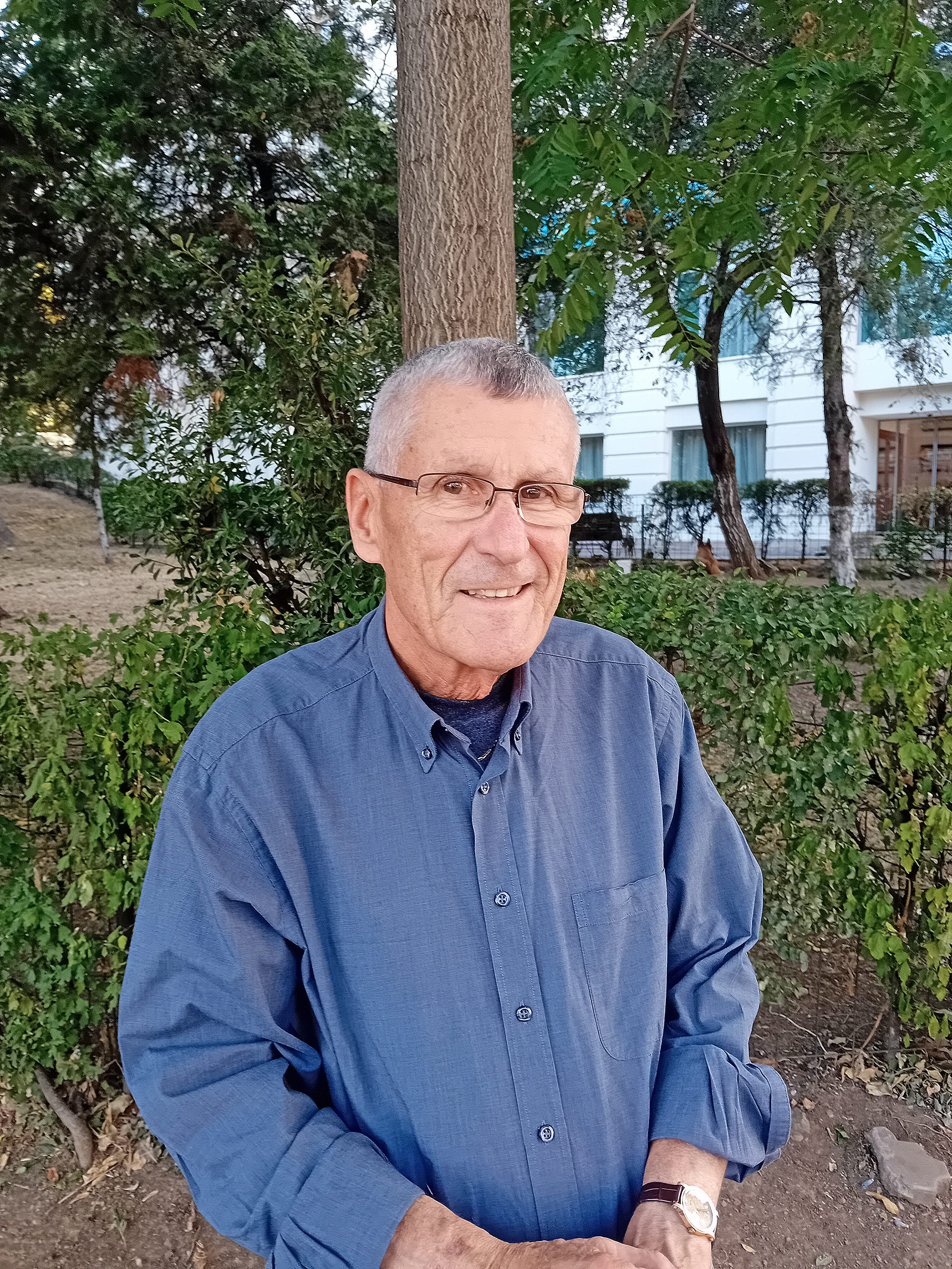Frank Hegedus: A ‘Fool for Christ’ With an MBA

Rev. Frank Hegedus.
Photo by James Cloke.
He has a bachelor’s in German, an MBA and a Doctor of Ministry. He’s been a clinic manager, a financial planner, a professional counselor, and now a church chaplain in Budapest. You might say Frank Hegedus has “got a few T-shirts.”
There is no such thing, of course, as “an average” church minister, but if there were, Frank Hegedus, Chaplain of St Margaret’s Anglican Church, Budapest, would surely be way off the mean.
“I’ve become famous at St Margaret’s for saying, ‘Let’s have a coffee; when are you free?’” he says, sipping a cup in a District VII cafe. The Rev. Dr. Frank Hegedűs (although it’s not on his birth certificate, he uses the Hungarian “ű” in his official title) seems to have spent much of his life talking to people.
Born and raised until he was 10 in Muskegon, a small, industrial city close to Lake Michigan in the United States, he says his “childhood dream” was to become a priest. He joined the Greyfriars, a group within the Franciscan order, and went to St. Louis University to study German literature, followed by a Fulbright Scholarship in Germany itself.
“I did my basic theological training at the University of Munich. And then, I went back to the States, worked in a parish for a while, but became disillusioned with the Catholic Church,” he recounts, although he declines to go into details.
“I’m not casting aspersions by any means: I have a very high regard for the Catholic Church; it just wasn’t for me.” There followed a substantial period of secular life and work.
“I got a job as a clinic manager in a large hospital in Minneapolis. I thought, ‘Well, this is cool, but I should know what I’m doing!’ So, I [went] back to get a [more relevant] degree,” he says.
Thus, in his early 30s, he entered business school at the University of St. Thomas, Minneapolis, studying for an MBA. This turned out to be something of a struggle.
“It wasn’t Harvard, Yale […] but for me, it was challenging. I envied, admired, I guess, some of my colleagues for whom the number crunching was natural and just obvious. For me, it wasn’t obvious at all!” he recalls.
Rather than amortization rates and discounted cash flows, Hegedus was interested in “the intersection of work and people, and how that functions,” as he puts it.
Bizarre Move
Given this, his next move seems bizarre. “I don’t know why I ever thought to go into financial planning, which I did a bit later. That was really stupid. I got a stockbroker’s license, [but all] I found was: Now I know another thing that’s not for me!”
Perhaps heeding his mistakes, he turned to counseling for corporations in so-called Employee Assistance Programs (EAP). EAPs enable businesses to provide short-term counseling intervention, in-person or by telephone, for personal issues. It’s free to the employee, the idea being a happy worker is a better, more productive worker.
“These are pretty big in the States, less so in Europe, perhaps,” Hegedus notes. By now, he had obtained a Doctor of Ministry, a counseling qualification.
“We were trained to know when someone’s problem was just a normal, everyday ‘my dog’s died, and I’m really sad’ issue, as opposed to ‘I’m seeing ghosts and hearing voices.’ I can’t treat such people; they need a specialist, as opposed to somebody who just needs a little hand-holding because they’ve got fired, had a fight with their spouse or something,” he says.
Around this time, in the mid-1980s, he ran into a minister of the Episcopal Church, a branch of the worldwide Anglican Communion.
“We were pretty much the same age and had both been ordained on the same day in the same city but in different denominations. So, we became friends, and he ushered me into the Anglican world, and I’m forever grateful to him for that,” Hegedus recalls.
As a result, in early 1987, he became a U.S. Episcopal minister, initially keeping his day job before becoming a full-time priest, including a stint at a parish in Silicon Valley, California.
Fast-forward two decades, a period in which Hegedus had been increasingly strengthening his ancestral links with Hungary, his father having been born in Kány, a tiny village in rural, northeast Hungary. Then, he saw a vacancy for the position of pastor of St. Margaret’s Church. Hegedus landed in Budapest to begin his new ministry on April Fools’ Day, 2011.
“I arrived not knowing for sure what I was getting myself into: a church community half a world away from the California I knew so well and made up of members from around the globe,” he recalls.
“My predecessor, Canon Denis Moss, had done a marvelous job of getting the chaplaincy off the ground and on a sure footing, excuse the mixed metaphors, but I felt we needed to grow and reach out even more broadly to the English-speaking community at large in Hungary.”
Life Journey
Hegedus’ unique life journey invites a slew of questions. How, for example, does an MBA add value to his pastoral work?
“I sometimes facetiously say that I learned more theology in business school than I did in seminary because a good business manager has, to use the church word, to take stewardship [seriously],” he says.
For the mid-Western chaplain, it’s a question of caring for resources: a manufacturer, for example, has to ensure all equipment is in top shape while simultaneously caring for the workforce, such as providing EAP.
“And you have to realize that is part of what a priest does too [...] take care of the human elements,” which is, he chuckles, “God’s resource at work in the world.”
As for counseling, pastoral work is far less intense. Yet, some of the most moving stories are similar, involving someone coming to terms with infidelity or addiction, “both of which can be devastating to the individual and to their loved ones,” he reflects.
One thing about finance that he did learn from his MBA, however, has held him in good stead.
“Let’s be honest, churches are businesses. [...] I’ve forgotten all that finance stuff, but I did learn enough to know you’ve got to have good people to take care of your finances. And I’m blessed with some sharp people here to help me with that,” he emphasizes.
So, it’s back to stewardship, and the team effort at St. Margaret’s certainly appears to have paid off.
“We have grown in the past decade from Canon Denis’ sure foundation and very nearly doubled in size, nowadays approaching nearly 50 congregants on many Sundays. Saint Paul speaks of being ‘fools for Christ,’ and I guess that is sometimes just what we need to be to make it all work [...] And not just on April first.”
You can contact Hegedus or St. Margaret’s via the website anglicanbudapest.org.
This article was first published in the Budapest Business Journal print issue of October 20, 2023.
SUPPORT THE BUDAPEST BUSINESS JOURNAL
Producing journalism that is worthy of the name is a costly business. For 27 years, the publishers, editors and reporters of the Budapest Business Journal have striven to bring you business news that works, information that you can trust, that is factual, accurate and presented without fear or favor.
Newspaper organizations across the globe have struggled to find a business model that allows them to continue to excel, without compromising their ability to perform. Most recently, some have experimented with the idea of involving their most important stakeholders, their readers.
We would like to offer that same opportunity to our readers. We would like to invite you to help us deliver the quality business journalism you require. Hit our Support the BBJ button and you can choose the how much and how often you send us your contributions.








.png)

